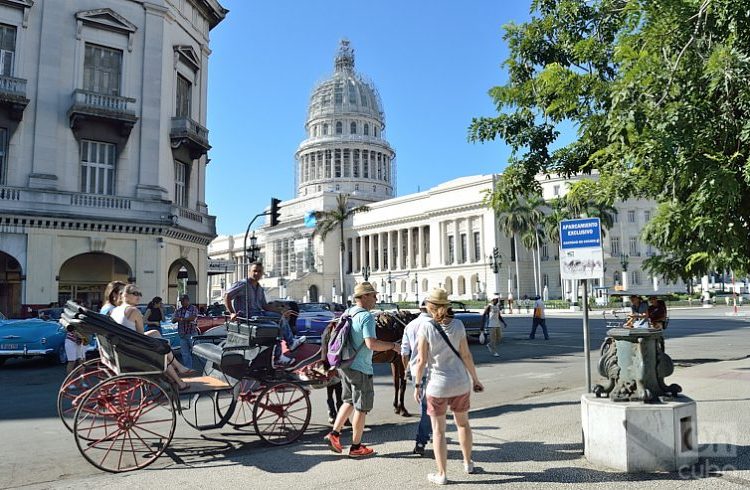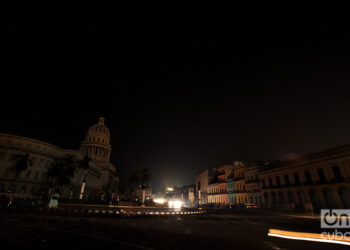The last two years’ boom in U.S. visitors to Cuba as a consequence of the thaw between the two countries was in the sight of the current U.S. president and his Cuban-American advisers, anxious to tighten the rope around the neck of the island’s government.
Trump had advanced it on June 16 in Miami’s Manuel Artime Theater: the categories authorized to travel to Cuba would be revised, the individual “people-to-people” trips would be forbidden and a greater control would be applied to the other categories.
The more than 346.000 Americans – none as tourists – who traveled to Cuba in the first semester of 2017 – a 149 percent increase with respect to the same period last year, according to a recent article in The Hill – and the more than half million that should be registered at the close of the year, were much more than what Trump seemed ready to allow.
Five months later, after many debates, tensions and lobbying, the sanctions took effect and fulfilled – at least on paper – what was announced, with the denunciation of alleged acoustic attacks against U.S. diplomats in Havana and the Department of State warning to its citizens to not travel to the island as a backdrop.
In principle, the result has been that of concern and uncertainty. For the time being the real reach of the approved restrictions has generated more questions than answers among possible visitors.
A few days ago, John Kavulich, who presides over the U.S.-Cuba Trade and Economic Council, said to EFE news agency that the new regulations were designed “to create anxiety among travelers and businesses, and that is exactly what it is achieving.”
For Kavulich, the possible reduction of U.S. visitors to Cuba will be the principal negative effect of the Trump measures, an opinion shared by other businesspeople and analysts.
The categories of the discord
One of the principal focuses of attention is the – announced and carried out by Trump –prohibition of the individual “people-to-people” trips and keeping the category of “support for the Cuban people.”
Michael Zuccato, general manager of Cuba Travel Services, in Cypress, California, estimates that “not all [Americans] are familiarized with these terms. They are going to get mixed up.”
Zuccato reminded the Travel Market Report site that the “people-to-people” category – the fruit of the relaxing of trips to Cuba by the Obama administration – was the most popular before the new regulations because it gave individual travelers “greater freedom to carry out their activities.”
Its elimination supposes a real change in the Obama policy. However, in the opinion of Zuccato, “if people want to travel to the island, they may do so. The real impact is the confusion and hysteria, and the appearance that traveling to Cuba is banned.”
As an alternative to travel individually to the island the “support for the Cuban people” category stayed the same, and neither were other categories like family, religious, humanitarian and professional visits affected.
The authorization for the U.S. airlines and cruise companies to travel to Cuba remains the same, although in the case of the first some have announced cuts and suspensions faced by the new scenario.
For John McAuliff, executive director of the Cuba-U.S. Fund for the Reconciliation and Development of the People-to-People Alliance, it is a “change in terminology” that doesn’t close the island’s doors to visitors from his country.
However, not everything is that simple.
William LeoGrande, professor of the American University, explains that the “support for the Cuban people” category demands “a complete agenda of actions that are, in effect, designed to undermine the Cuban government’s authority.” In his opinion, this requirement “will certainly dissuade some travelers, because doing that could suppose for them legal problems in Cuba.”
Even the Cuban authorities, after the announcement of the measures, showed their nonconformity with that section, to which they attributed a “political” and “subversive” intention.
According to the Department of the Treasury, the “support for the Cuban people” category seeks to “strengthen civil society in Cuba.” Any person who travels under it must comply with a full-time schedule of activities that represents “a significant interaction with the Cuban people,” an ambiguous concept that, according to Chad Olin, CEO and founder of the Miami-based Cuba Candela Company devoted to personalized tours to the island, “could make it difficult for an average traveler to feel comfortable requesting this permit.”
Although traveling under that category only implies filling a box in a form on the plane, and does not demand – for the time being – presenting any prior itinerary to the Department of the Treasury, Olin adds another aspect to take into consideration: the fact that travelers have to keep all the receipts of their visit to Cuba for five years in case the Department of the Treasury carries out an audit that can imply fines for noncompliance.
Olin believes that this reason can incline many to go on group trips. “There is always the possibility of an audit or that the U.S. customs questions you on returning. But if you travel with an authorized group you shouldn’t worry. Its organizers are in charge of that for you,” he affirms.
Optimism despite everything
Despite its ambiguities and restrictions, Trump’s new measures against Cuba are not the slam that many feared and others wanted.
“The reality is that beyond the prohibition of hotels and other tourist sites, the situation hasn’t changed much beyond renaming the category of independent trips,” said John McAuliff to Travel Market Report.
The Airbnb platform, on which since it entered Cuba more than 22,000 rooms for rent were registered, was one of the first U.S. companies to react to Trump’s measures.
“We appreciate that the hosts continue having the opportunity of sharing their space and that the guests can continue visiting the island. The hosts in Cuba have received guests from all over the world and these regulations will allow Airbnb to continue supporting private Cubans who share their homes,” the company pointed out in a communiqué.
Tom Popper, president of the insightCuba Agency, is of the opinion that the fact that Americans can still travel to Cuba is good news.
“When President Trump announced last summer that he was going to repeal Obama’s policies of commercial opening and travel relations with Cuba, we didn’t know what was going to happen,” Popper explains. “But here we are in November and the people can still travel…. Most of the Obama policy changes are still in force.”
His point of view seems to be backed by U.S. travel agencies and tour operators that, after the measures took effect, referred to their scarce impact on their business.
The Globus Agency told Travel Market Report that the new regulations have “no negative effect” on their programs and these are “in complete compliance” with said regulations.
Meanwhile, Tauck Tours anticipated a “zero impact” on its operations on the island, and said that it expected to operate 100 percent of its programmed departures for 2017 and 2018. It even went further: “the prohibition of the individual trips to Cuba (and the resumed requirement that U.S. citizens visit only as part of an authorized group) will probably boost additional business our way.”
This position is also shared by Chad Olin, of the Cuba Candela Company, who insists that the group trips are a viable alternative for Americans: “The persons seeking to go on their own to Cuba are now getting together in groups. And we are hearing about people with booked trips who are seeking a clarification.”
“Due to the lack of clarity, the average traveler will have difficulties to depend on the individual trip permit, but what most Americans are not aware of is that they can still comply with the government regulations with a group made up of just two persons. They can make up their own group with friends, family, and still comply with the requirements,” Olin affirms.
And there could be other gaps in the new regulations.
Peter Hakim, president emeritus of the Center for Inter-American Dialogue Studies, estimates that “the difficulty in understanding the regulation” will drive “some travelers to get to Cuba through other means, like Mexico and Canada,” a usual method in the past.
And Michael Zuccato remembers that “Cuba has been a successful destination without the United States. And if to continue being so means changing hotels to different ministries, marketing for different entering groups, then it will make the necessary adjustments.”
More to come?
The regulations approved until now prevent U.S. visitors from staying in Cuba in some 80 state-run hotels, using two travel agencies, visiting five marinas as well as different shops and other Cuban entities linked to the island’s armed forces.
According to Travel Market Report, “these restrictions could affect a tourist’s desire to experience the authentic Cuban culture, since U.S. travelers will supposedly trace their activities while in Cuba, and will present a register of the same to the U.S. officials on their return if requested to do so.”
Frank Reno, president of Cuba Executive Travel Inc. in Apollo Beach, Florida, regretted the prohibition of certain hotels since he considers “fundamental” that the trips by Americans to Cuba have “the comforts that could be expected in other destinations.”
So did the Ya’lla Tours Company, which used in Baracoa, in the eastern tip of Cuba, hotels “owned by the military.”
“Unless something changes, we will no longer be able to include that area in our programs,” the company pointed out in a communiqué. However, it recognized that the general impact of the sanctions on its business in Cuba would be very little and commented that “many of the forbidden hotels are beach resorts, which doesn’t affect Ya’lla Tours or any other U.S. operator, since beach holidays have never been allowed by virtue of the travel restrictions between the United States and Cuba.”
However, up to now what has been regulated is not definitive. Different analysts opine that, just as Trump announced in June, there could be updates of the restricted entities and services. Factors like the possible reaction of the Cuban government in relation to the measures – and until now it has limited itself to official statements – and pressure from the Cuban-American lobby in Congress could tighten them.
Florida Senator Marco Rubio, for example, showed his dissatisfaction with the measures and asked the Trump government for more restrictions. That, for example, he forbid dealings with other Cuban tourist companies, like the Gran Caribe and Cubanacán hotel chains.
Rubio regretted that “the bureaucrats in the Department of State who are opposed to the president’s Cuba policy refused to implement it completely.” His opinion is shared by other Republican congresspeople and politicians, who demand putting greater pressure on the Havana government.
Despite this, for tour operators and businesspeople like Michael Zuccato and Tom Popper, the coming into force of the measures at least put an end to the previous mystery, and to a great deal of uncertainty.
Americans, Travel Market Report reaffirms, “can still travel to Cuba, with greater freedom than at any other time in decades, except for the brief period in which individual travel to Cuba was allowed.”
For the specialized publication, it is true that “no one can predict what President Trump will do at a given time. But it seems he has other things on his mind for a long time to come. His original proclamation that he was going to repeal Obama’s Cuba policies introduced uncertainty in the market and the tour operators saw that the slowness was turning into demand. Now, after a year, that uncertainty has been lifted.”
For the time being.
TN: Quotes were retranslated from the Spanish.










